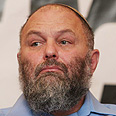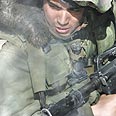
Efi Eitam
Photo: Gil Yohanan

Scene from "Beaufort"
Joseph Cedar’s latest movie, “Beaufort”, which last week earned the Best Director’s Prize at the International Film Festival in Berlin, managed to draw the ire of MK Effi Eitam, a former commander of the IDF forces in Lebanon.
“I could almost smell the unique smell of the explosives when the shells were detonated and feel the hot blast on my face. (The smell) is like the soldiers – a mixture of male sweat, gun oil, and uniforms and shoes that haven’t been changed in a long while,” Eitam rhapsodizes on his blog.
The film, which follows a group of Israeli soldiers posted in southern Lebanon in the months leading up to the IDF withdrawal from the area, figures prominently on Eitam’s newly-launched blog.
“For me, the Beaufort is not just a book and a movie; it’s mainly an emotional chapter of my life,” Eitam writes. “One can say that some part of me remained there on that mountain, which holds a combination of the sad and the painful; the essence of war and horror together with moments of friendship and camaraderie and breathtaking views that are revealed at dawn.”
Eitam, who describes the Beaufort as a symbol of determination, friendship, and stubbornness, confesses that he found it difficult to watch the fortress being blown sky-high on the big screen. The movie shows how the flag was lowered and the casualties removed – including Goni Hernik, who was killed when the position was captured in 1982 – before the explosion.
Winner
Merav Yudilovitch
Israeli war movie wins Josef Cedar director's award at international film festival. Cedar: 'I hope our leaders will be afraid of wars'
“I could feel the warmth of that small corner in the bunk bed next to the wall, which is the only place that’s really yours,” Eitam continues. “With the days marked off on the calendar and the picture of the gang, the ability to block out the world and, for a brief moment, to be in a place that’s all yours.
“The constantly tired eyes and the body that cries out for sleep; the spirit that’s spurred to action by the shouts that someone has been hit and the shattering view of a friend’s mangled body. I can still feel the fear that one must overcome.”
Eitam’s blog - like Cedar’s movie, which is based on Ron Leshem’s book “If There Is a Paradise” – sentimentally portrays the male-bonding world of the soldier. “The whirr of the helicopter’s engine,” “the hot engine vapor and the smell of burning fuel,” and “the commander’s eternal loneliness” – these are all phrases that Eitam uses when discussing the film, which he calls “a journey back in time.”
While admitting that the movie induces a wave of nostalgia, Eitam condemns what he refers to as the film’s overriding motifs: Despair, defeatism, and aimlessness. “The fighters in Lebanon,” he observes, “knew very well what the objective was and fought aggressively and with initiative.”
Months before the withdrawal, Assistant Chief of Staff Moshe Kaplinsky took over from Eitam as commander of the IDF forces in Lebanon. Eitam takes particular issue with the scene in the movie in which the position commander tears down a sign that states that the mission objective is to protect the northern communities and Israel’s northern borders.
“When this objective is removed from the wall and thrown into the garbage pile that is going to be blown up, the basis and the justification for the entire war - including the right to demand that people endanger their lives – are essentially removed.
“Retreating from military and national positions, lowering the flag, and ‘converging’ behind fences is a recipe for failure and disaster,” he adds. “That’s not the way to build a nation, national pride, or deterrence power.”
Two sides to the story
“Cedar’s movie has two sides,” Eitam noted in a telephone interview from Canada. “First is the human and thrilling (side) which successfully depicts, in great detail, the military experience: The small rituals that an outsider wouldn’t understand, the tension and the danger and the human reactions when the shells start falling. And I could really identify with all this.
“The second – which was more difficult for me – is the choice made to view the Beaufort through a narrow and defeatist prism, which relates to a specific period of time when they lived on borrowed time without any objective.
“To present only the aspect of the sitting ducks, without addressing the 18 years of fighting, which included offensive operations, is leaving out part of the story. The movie doesn’t discuss the heroism and the bravery and the skill of the fighters who defended the northern communities for many years.
“Whoever watches this movie is likely to think that this entire war was just a matter of inane duck shooting. I have no doubt that in this respect, the producers had an agenda. (They wanted) to portray this war and every war as pure folly and a cynical waste of life.
“It’s as if when trying to demonstrate a birth, instead of showing the baby, they would just show the pains. People wouldn’t want to give birth; they wouldn’t understand what a great joy it is.
“There aren’t any happy wars, but there’s logic and a goal behind war which make it worth the sacrifices that it demands. It’s like trying to describe flying in an airplane, based on the last few minutes before it crashes to the ground.
“During those moments before the crash, one can only think about personal survival, but that wasn’t the overall atmosphere in Lebanon. That’s not how we operated,” Eitam insists.
If Eitam had been the film’s editor, he would have inserted a caption at the beginning of the movie, briefly listing the IDF’s numerous victories over Hizbullah in Lebanon. In addition, he would have added an epilogue in order to show the effects of the withdrawal, including this past summer’s war.
“The film raises an important point that we learned with our own flesh this past summer, and that is that a war must have an objective,” Eitam asserts. “And when there’s no objective, every military action becomes a matter of personal survival.”
Eitam views the film’s European accolades with suspicion. “Europe loves us very much when we’re being persecuted, pathetic, being killed, oppressed and running away,” he concludes.
As a former commander of the Golani Reconnaissance Company, Eitam takes great pride in the IDF. “Golani captured Tel Fahar, the Hermon, and the Beaufort,” he says. “To capture the mountain means to confront, to face the toughest challenges and the biggest objectives.
“It’s not the machismo of extreme sports. It’s defense, which means reaching and neutralizing the most entrenched and dangerous enemy.
“Golani is the brigade of capturing summits. We need men who will climb the mountain even when they are being shot at. Someone has to do the work.”















